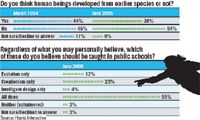Back Page: Evolution? It's Not Right!
The pharmaceutical industry depends on good science. So what does it mean when a majority of the US population turns its back on one of the fundamental insights of modern biology?
The Religious Right, including many —but not all—born-again Christians, Evangelicals, Catholics, and Mormons, probably enjoys more power and influence today than at any time in the past. And support for some of its political positions has been growing. If this support continues to grow, it is likely to influence the future of medicine, healthcare, and medical research.

Humphrey Taylor
Religion, politics, science, and healthcare touch in many places. The Religious Right tends to have strong and different opinions on evolution, embryonic stem-cell research, abortion, end-of-life issues (remember Terry Schiavo), sex education, HIV prevention, contraception, and abstinence. Members of this group may also have different opinions and priorities on Medicare, Medicaid, healthcare reform, and support for international programs on everything from SARS and avian flu to family planning and HIV/AIDS.
Many people in the scientific community were alarmed by a recent Harris Poll showing an increase in the already large number of people who do not believe that human beings evolved from other species, and who think that creationism and intelligent design should be taught in public schools along with evolution. For those who believe in evolution, the numbers are pretty scary:
- A majority of adults (54 percent) do not think human beings evolved from earlier species—an eight-point increase since 1994.
- Only 49 percent of adults believe plants and animals evolved from other species.
- The public is evenly divided about whether or not apes and man have a common ancestry.
- Only 46 percent of adults believe that "Darwin's theory of evolution is proven by fossil discoveries."
- Most people (55 percent) believe the public schools should teach creationism, intelligent design, and evolution. Only 12 percent would limit education to the teaching of evolution.
It is reassuring to note that education makes a big difference and that college graduates, and especially postgraduates, are much more likely to believe in evolution. But it is remarkable that even among those with a postgraduate education, fully one-third do not believe that humans evolved from other species.

Do you think human beings developed from earlier species or not?
This, of course, is an issue where Americans look very different from Europeans. Surveys there have reported that between 70 percent and 95 percent of the public, varying from country to country, believe that humans evolved from other species.
Another interesting finding is that public attitudes are often not ideologically consistent. Many people who agree with the Christian Right on evolution and creationism support embryonic stem cell research, the withdrawal of food and water from Terry Schiavo, sex education, abortion rights, and the use of condoms to prevent HIV/AIDS. But public opinion has often changed in the past and will do so in the future.
The pharmaceutical industry, as a major science-based industry, should be deeply committed to promoting the public understanding of, and support for, good science. If so, the possibility of the Christian Right having more influence over science-related policies may sound some alarms.
Humphrey Taylor is chairman of the Harris Poll, Harris Interactive. He can be reached at htaylor@harrisinteractive.com

The Misinformation Maze: Navigating Public Health in the Digital Age
March 11th 2025Jennifer Butler, chief commercial officer of Pleio, discusses misinformation's threat to public health, where patients are turning for trustworthy health information, the industry's pivot to peer-to-patient strategies to educate patients, and more.
Navigating Distrust: Pharma in the Age of Social Media
February 18th 2025Ian Baer, Founder and CEO of Sooth, discusses how the growing distrust in social media will impact industry marketing strategies and the relationships between pharmaceutical companies and the patients they aim to serve. He also explains dark social, how to combat misinformation, closing the trust gap, and more.